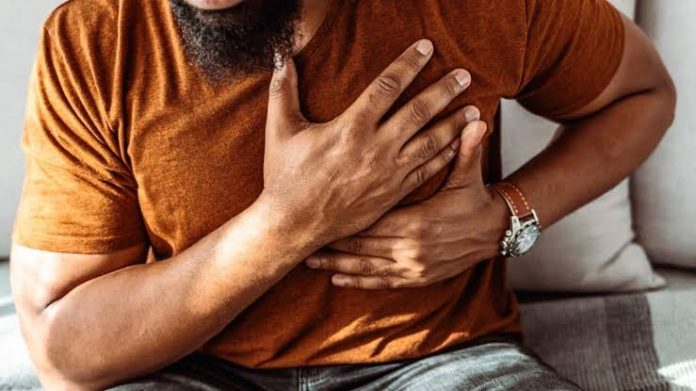Here’s Exactly What a Heart Attack Feels Like, According to Cardiologists
Here’s a sobering fact: According to the Centers for Disease Control and Prevention, someone has a heart attack every 40 seconds in the U.S. Scary, right? Something else about heart attacks that many people may not know is that an estimated one in five heart attacks are “silent,” which means they happen without the person even realizing it. That’s definitely a far cry from how they’re portrayed in movies and TV shows, with a person dramatically clutching their chest before falling to the ground.
Anytime someone has a heart attack—silent or not—Dr. Adriana Quinones-Camacho, MD, a cardiologist at NYU Langone Health, says it’s important to go to the emergency room ASAP. That’s why it’s crucial to know exactly what a heart attack feels like, as well as what you can do to prevent it from happening in the first place.
What Is a Heart Attack and What Causes It?
Dr. Doris Chan, DO, an interventional cardiologist at NYU Langone Hospital—Brooklyn, explains that a heart attack can happen when oxygen-rich blood flow to the heart is severely or completely reduced. Dr. Quinones-Camacho adds to this, saying, “The heart is a muscle and just like other muscles in the body, it needs blood flow in order to get oxygen and nutrients.” When this doesn’t happen and the heart is deprived of oxygen, a heart attack occurs.
 Learn More
Learn MoreREAD ALSO: 2 Beverages That Are Rich in Chlorogenic Acid, a Potent Anti-Inflammatory Agent Known To Help Stave Off Chronic Illness
How can the heart get deprived of oxygen in the first place? Dr. Quinones-Camacho explains that over time, cholesterol can build up on artery walls. “Usually a heart attack happens when the plaque of cholesterol ruptures,” she says. “The rupture releases the contents into the bloodstream and this can cause blood clots to form, which then can lead to a heart attack.
IMPORTANT: You can now Click “HERE” to receive More updates directly on your WhatsApp!
Dr. Chan says that anyone is at risk for having a heart attack and she has seen people aged 20 to 100 come through the hospital doors experiencing them. But she says that there are certain factors that substantially increase the risk, which include being older (men older than 45 and women older than 55 are more at risk), having a history of smoking, having a higher body mass index and having comorbid conditions such as hypertension, hyperlipidemia, diabetes or kidney disease.
What Does a Heart Attack Feel Like?
Dr. Chan says that there are many ways blood flow to the heart can be severely restricted or blocked—which is why not all heart attacks feel the same. “However, the most common symptoms are chest discomfort with or without sweating, shortness of breath, left arm discomfort, jaw pain, back pain and neck pain,” she says.
READ ALSO: 5 Foods To Avoid Eating Before You Board A Flight
Typically with a heart attack, Dr. Chan says that a person will experience chest pressure, which may or may not cause them to sweat. At the same time, the person can become short of breath and feel discomfort in their left arm, jaw, neck and back.
READ ALSO: ✳️ *What Happens to Your Body When You Eat Red Meat Every Day*
Like in movies and TV shows, Dr. Quinones-Camacho says that heart attacks can be very sudden and dramatic. But other times, she says there are warning signs occurring days before. “Often, patients report stuttering and mild symptoms that come and go—often during physical exertion—a day or a couple of days before the more dramatic event [that being the heart attack],” she says. This is why if you are experiencing any chest pain or shortness of breath, it’s important to see a doctor right away; it could prevent a heart attack from happening.
IMPORTANT: You can now Click “HERE” to receive More updates directly on your WhatsApp!
Both doctors say that it’s important to know that this is not the only way a heart attack can manifest. “There are many atypical presentations as well, especially in women or patients with diabetes,” Dr. Chan says. This includes the so-called “silent” heart attacks. Signs of a silent heart attack, according to both doctors, can include mild chest pain or pressure (which may come and go), mild discomfort in other parts of the body (most commonly the arms, jaw, neck and back), sudden onset nausea, vomiting, fainting, shortness of breath, profuse sweating or a feeling of severe indigestion.
Contributed By EMILY LAURENCE
WATCH THIS: 













![The 17 Habits Of Truly Wealthy People That you can easily adopt now [Real powerful stuff]](https://worldfamilydigest.com/wp-content/uploads/2022/02/FA033A84-800B-424D-8DEA-2BB8AD9E91F6-100x70.jpeg)

